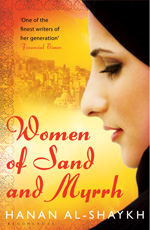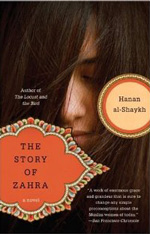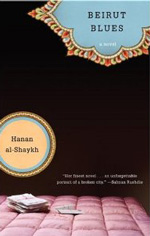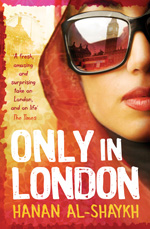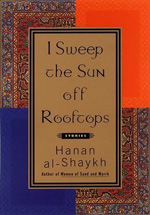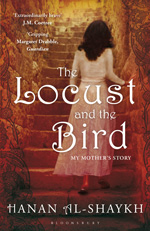
Hanan al-Shaykh is a writer who defies definition. In a publishing environment that relishes stories of oppressed Muslim women, she has remained something of an enigma. Her novels are full of examples of women suffering from both social and sexual repression, but are not overt criticisms of entire faiths or cultures. The frequency with which sex is portrayed has led some to label her prose as 'erotic', but her novels are poles apart from the sort of titillation that this label suggests. The truth is that Hanan al-Shaykh is not grinding political axes, or settling scores with entire cultures, and she is certainly not pandering to an English-language audience desperate to read about what a terrible place the Arab world is for women. The truth is that Hanan al-Shaykh writes with a brutal honesty about Hanan al-Shaykh, and it is this that makes her one of the Middle East's finest contemporary writers.
Al-Shaykh was born in Lebanon in 1945, into an Arab Shi'a family. Her life was dominated by a devoutly religious and socially conservative father who limited her social freedom. Throughout her education she was kept separate from boys. Her life in Lebanon was interrupted by the Arab-Israeli wars of 1948 and 1967, and the 1975 outbreak of the Lebanese civil war. The latter prompted her to move to Saudi Arabia, then London, where she now resides. The story of al-Shaykh's life is one of staid social repression punctuated by violent upheavals, a story she tells and re-tells in a variety of guises through her fiction.

Central to all of al-Shaykh's books are women on a quest to discover the source of their own freedoms. Her female characters are constantly denied ownership of anything: money, property, even their own sexuality. To them, ownership is freedom. Freedoms are sought in tiny moments and grand acts, but, overwhelmingly, it is in migration and sex that al-Shaykh's women pursue their quests.
Many of al-Shaykh's characters try to escape physically from the world that is oppressing them by leaving their homes. In Beirut Blues, a stunning epistolary novel written as both homage to and condemnation of Lebanon during the civil war, Asmahan writes a series of letters about her home country. Their recipients are her friends, famous figures, even the war and the country itself. In the letters, her instincts and her relationships draw her ever closer to the airport and a new life away from the war-torn city. In perhaps her best-known book, Women of Sand and Myrrh, the Lebanese Suha and the American Suzanne have both migrated to an unnamed Gulf State (resembling Saudi Arabia) to start new lives. Suha falls afoul of the oppressive rules prohibiting women from public places, and is soon caught up in the boredom of a life lived behind closed doors. Throughout the novel, she seeks escape in another migration, a return to Lebanon and its war.
Only in London is a novel gleaned from al-Shaykh's life in the UK. In it, three Arabs—the Iraqi Lamis, the Moroccan prostitute Amira and the Lebanese homosexual man, Samir—explore, exploit and occasionally fail to understand the freedoms offered by their adopted home. Migration (al-Shaykh does not like the term 'exile'), gives her characters room to breathe, but does not offer a simple solution to the search for identity. In Women of Sand and Myrrh, for instance, the American Suzanne is more comfortable in the gilded cage of the Gulf State than is Suha; and when Lamis visits Oman with Nicholas, her English lover in Only in London, it is her, not him, who does not feel at home.

The second route to freedom for al-Shaykh's characters is to take control of their own sexuality. Her books contain a complex relationship between sex, pleasure, control and marriage, and it is this, more than anything, that has defined her as a writer. al-Shaykh's female characters strive to maintain ownership of their sex lives when everything else is out of their control. Although sex and marriage are intimately linked by society and family for most of the women, they have, as in all societies, the possibility of extra-marital sex and, at the very least, private sexual thoughts. This means that although marriage can be controlled by families for social or financial gain, there is always a small part of their lives that women can never be forced to share entirely. This dichotomy gives them the only freedom they sometimes have, because sex is the one part of their lives that is not public property. In Beirut Blues, Asmahan's mother puts this in no uncertain terms, describing her daughter'’s vagina as her 'gold mine'’. Another woman, a singer called Ruhiyya, can bewitch men with her voice, leading her to refer to it as 'her sex'.
The decision of how to use their sex lives as a source of freedom is central to all of al-Shaykh's characters. In an imagined letter to Jill Morell, girlfriend of a real-life kidnapping victim in Beirut, Asmahan describes her route to freedom as engineering the correct 'kidnapping', i.e. giving herself sexually to the right man. In Women of Sand and Myrrh, the practice of covering young girls with veils is done not on religious grounds, but to stave off the loss of their virginity for as long as possible, so that their sexual currency is not diminished too early in life. The idea of sex as currency means that it is also frequently without pleasure. Characters who are unable to experience pleasure during their public relationships do so only during illicit sex. In The Story of Zahra, al-Shaykh's earliest translated novel, the title character has an affair with a faceless sniper who poses a threat to her life. In Only in London, Lamis retreats into illicit private fantasy, and when her relationship with Nicholas becomes less sexual, it is her, rather than him, who panics. Despite her love for him, she struggles to escape the notion that her control of the relationship is based on her control of sex. In Women of Sand and Myrrh Nur, a bored socialite finds pleasure in a homosexual affair simply because it is forbidden, and in Beirut Blues, Asmahan is bewildered by her grandfather's affair because she cannot distinguish between love, happiness and manipulation. By contrast, Suzanne's affair with a man in Women of Sand and Myrrh grinds to a halt because her lover is disgusted by her attempts to enjoy the sex they have together. Interestingly, several of al-Shaykh's characters, such as Lamis, Asmahan and Sara (in the short story "A Beauty Parlour for Swans"), seek freedom in sexual liaisons, only to find that the sex was peripheral to the freedom.

Although al-Shaykh's books are often set against the backdrop of the upheavals in Lebanon, they are rarely overtly political. Indeed there is an absurdity to the politics she describes. As Asmahan puts it: "How can I answer your questions about the state of our country, when my chief worry is about the rat occupying our kitchen?" She bemoans the failure of nature to stop for the war, and confesses an 'odd intimacy' for it. Zahra's brother, Ahmed, fights in the civil war, but does not seem to understand his own part, beyond the freedom to loot, while his family struggles to decide which side they should be on. Many of al-Shaykh's characters are just trying to get by, regardless of ideology. The image in Beirut Blues of golfers hiding in the clubhouse when shooting starts, only to re-emerge to finish their rounds when it subsides, is a perfect metaphor for the author's opinion about what she sees as a confusing and absurd conflict.
Although the politics of Lebanon loom large in all of al-Shaykh's books, it is the impact of politics on ordinary lives she is most interested in. For her, war isn't a game played by politicians and generals, but is something suffered by ordinary people. Once again, even when writing about world-changing events, Hanan al-Shaykh is still just writing about what she knows best: Hanan al-Shaykh.
It took me a while to understand al-Shaykh's perspective. This was not because her work is not accessible, but because I was assuming too much about what an Arab woman might want to say. All I knew was that I liked her enough to read more. It was only when I read 2009's The Locust and the Bird that I began to understand how autobiographical her work is. This book is her only work of non-fiction: a biography of her mother. Incidents that lay scattered throughout her fiction appear as real events in her life and that of her family. The book begins with an apparently true conversation in which her mother berates her for airing the family's dirty laundry in public. Before reading The Locust and the Bird, I believed I had read a series of good novels from a talented writer. Afterwards, I realised that I was reading the raw details of a life laid bare.
Although her fiction is rooted firmly in her upbringing in an Arab society, and in her identity as a woman, you don't need
to be an Arab, or even a woman, to appreciate the candour and intimacy with which Hanan al-Shaykh invites you into her
life. Beirut Blues, Women of Sand and Myrrh and the short story collection I Sweep the Sun off Rooftops are
all outstanding works of fiction. Most of her early novels are still unavailable in English, but the ones we have access
to are testament to a wonderful writer. She has always remained on the periphery of the literary mainstream, frequently
praised but not necessarily widely read. She has become one of my favourites in the last few years. I hope she will become
one of yours.

Andy Barnes lives in Bristol in the United Kingdom. He is an avid reader on a mission to discover great writing from
as many parts of the globe as possible. Andy works in one bookshop, and volunteers in another, and when he isn't reading or selling
books, he is usually talking or writing about them.
